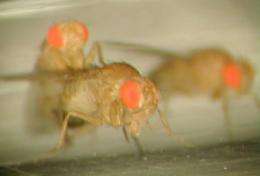Male fruit flies change to gain reproductive edge

(PhysOrg.com) -- When it comes to wooing females, males of all species -- even fruit flies -- try to gain a competitive edge.
Provided by Male fruit flies that sense competition during mating make their seminal fluid more potent by packing it with more proteins.
A study by researchers from Cornell, University of East Anglia and University College London focuses on two seminal fluid proteins in Drosphila melanogaster that are transferred to females during mating: sex peptide and ovulin. Both proteins influence the number of eggs a female fly produces. Sex peptide also makes females less receptive to other males after mating. Males that transfer more of these two proteins sire more offspring than other males.
"The presence of competition affects how much of these proteins are transferred," said Laura Sirot, a Cornell research associate in molecular biologist Mariana Wolfner's lab and one of the lead authors of the paper, published online and in a future print edition of the journal Current Biology.
The research offers a model for studying these seminal proteins and their role in reproduction. Fly seminal proteins are chemically related to similar proteins found in other insects and mammals, including humans. The research may one day also help entomologists develop new ways to control such disease-carrying insects as mosquitoes.
The study describes how researchers placed an extra male near a mating pair to test whether the mating male adjusted the amount of seminal fluid proteins transferred. In the face of competition, the mating male did indeed deliver more sex peptide and ovulin to the female.
To test whether male fruit flies with larger accessory glands -- a major site where seminal fluid proteins are made -- have an evolutionary advantage, the researchers selected and bred males with larger and smaller glands. The males with larger glands transferred more sex peptide than the ones with smaller glands, but the amount of ovulin transferred did not change.
Together, these results show that the amounts of seminal proteins do not necessarily change in correlation with each other and that selection for larger glands increases reproductive success. It also uncovers a new strategy by which males may be able to improve their reproductive success when faced with competition, said Sirot.
Provided by Cornell University

















